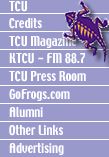|
Tuesday,
November 20, 2001
Endowment
losses force increased tuition hikes
By
Sarah McClellan
Staff Reporter
TCU’s
endowment, which is valued at about $900 million, has decreased
approximately eight percent as a result of rising inflation
and deprecations in the stock markets due in part to the Sept.
11 attacks, said Chancellor Michael Ferrari. The 8 percent
loss mirrors the overall loss of the stock market.
The
$72 million loss will cause tuition to increase from 6 to
8 percent for fall 2002 because the endowment’s earnings,
which make up 27 percent (or $51.3 million) of the $190 million
annual operating budget, have gone down, Ferrari said.
Carol
Campbell, vice chancellor of finance, said undergraduate tuition
increased 6.6 percent for fall 2001. The figure is slightly
higher than the expected yearly increase of between 4 and
6 percent, which is based on a more stable economy, she said.
Five
and a half percent of the endowment’s total earnings
contribute to the operating budget each year, Ferrari said,
and that amount will be lower this year.
“Because
we will expect less from the endowment than we’re accustomed
to, there will be greater pressures on tuition levels,”
Ferrari said.
The
endowment’s earnings subsidize tuition, Campbell said.
“The
lower the market falls, and the longer it stays down, the
larger the effect on our budget,” Campbell said. “A
piece of income that should subsidize tuition isn’t keeping
pace with always-increasing costs because of the slowing economy.”
Ferrari
said he does not think enrollment will decrease as a result
of the rising tuition.
“As the economy goes more into a recessionary mode the
demand for higher education
goes up,” Ferrari said. “The job market gets more
competitive and people realize they need more skills.”
Kathie
Little, executive director of financial aid services for the
College Board, said public and private universities have experienced
significantly higher costs for health insurance, utility bills
and faculty salaries due to inflation.
“Tuition
and fees go up every year because costs go up every year,”
Little said.
Campbell
said TCU’s tuition increases annually because of the
rising costs of higher education materials, such as library
materials, research equipment, technology equipment, faculty
salaries, insurance and utilities.
“This
is like running a small city,” Campbell said.
Tuition
increases are compared to the Higher Education Price Index,
which is based on a mix of goods typically purchased by colleges
and universities, such as research equipment and library materials,
Campbell said.
The
Higher Education Price Index’s inflation rate is higher
than that of the Consumer Price Index, an index developed
by the federal government to measure inflation, because the
prices of the products increase faster than prices of typical
consumer goods, Campbell said.
“(Higher
education goods) are sold to a much smaller market than the
goods produced for the mass market,” Campbell said. “So
they don’t benefit from the productivity gains or competitive
forces that hold other prices down.”
Though
tuition continues to rise, students should still plan on getting
a degree, Little said.
“The
issue, in terms of the impact of Sept. 11 on the economy,
is more fear from families that college is out of their reach
financially,” Little said. “It will be important
for colleges to look at how much they have in financial aid
dollars for needy students.
They
need to look at the affordability of their college.”
Financial
aid, however, has also increased as a result of the struggling
economy, said Mike Scott, director of student scholarships
and financial aid.
“There’s
always been a commitment to increase the financial aid budget
at least the same percentage as the tuition increase,”
Scott said.
He
also said as the tuition increases, eligibility for financial
aid increases.
|
